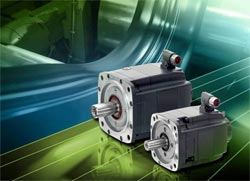New High Inertia Servomotors

Siemens Drive Technologies is supplementing its 1FK7 range of servomotors with a new High Inertia version. The higher intrinsic inertia makes the control response of the 1FK7-HI motor extremely robust, so that it is particularly suitable for use in applications involving high and variable<br>load inertia.
At this year's EMO machine tool fair in Milan, Siemens Drive Technologies is showcasing its new High Inertia version of the 1FK7 servomotor for the first time. The motors are used on the feed axes and auxiliary axes of machine tools.
The new 1FK7-HI High Inertia servomotor is characterized by its higher intrinsic moment of inertia. This makes the control response of the motors extremely robust and therefore especially suitable for applications with high and variable load inertia. Drive systems featuring the Sinumerik machine tool control system and motors from the 1FK7 series achieve very high contour precision without the need for time-consuming adaptation of the controller to the machine.
The self-cooled 1FK7-HI servomotors have been designed to be extremely resistant to vibrations and shocks and are available with torques of 3 Nm to 20 Nm. Like all motors of this design, they have an electronic nameplate and the version with the DRIVE-CLIQ serial drive bus is perfectly matched to the Sinamics S120 drive system. The SIZER tool is used for adapting and dimensioning the motors to match the respective application.
The Siemens Industry Sector (Erlangen, Germany) is the worldwide leading supplier of production, transportation, building and lighting technologies. With integrated automation technologies as well as comprehensive industry-specific solutions, Siemens increases the productivity, efficiency and flexibility of its customers in the fields of industry and infrastructure. The Sector consists of six Divisions: Building Technologies, Drive Technologies, Industry Automation, Industry Solutions, Mobility and Osram. With around 222,000 employees worldwide Siemens Industry achieved in fiscal 2008 a profit of EUR3.86 billion with revenues totaling EUR38 billion.
The Siemens Drive Technologies Division (Nuremberg, Germany) is the world's leading supplier of products and services for production machinery and machine tools. Drive Technologies offers integrated technologies that cover the entire drive train with electrical and mechanical components. This includes standard products but also encompasses industry-specific control and drive solutions for metal forming, printing and electronic manufacturing as well as solutions for glass, wood, plastic, ceramic, textile and packaging equipment and crane systems. The services provided by the Division include mechatronics support in addition to online services for web-based fault management and preventive maintenance. With around 39,900 employees worldwide Siemens Drive Technologies achieved in fiscal 2008 total sales of EUR8.9 billion.
Media Contact
All latest news from the category: Machine Engineering
Machine engineering is one of Germany’s key industries. The importance of this segment has led to the creation of new university degree programs in fields such as production and logistics, process engineering, vehicle/automotive engineering, production engineering and aerospace engineering among others.
innovations-report offers informative reports and articles covering technologies such as automation, motion, power train, energy, conveyor, plastics, lightweight construction, logistics/warehousing, measurement systems, machine tools and control engineering.
Newest articles

First-of-its-kind study uses remote sensing to monitor plastic debris in rivers and lakes
Remote sensing creates a cost-effective solution to monitoring plastic pollution. A first-of-its-kind study from researchers at the University of Minnesota Twin Cities shows how remote sensing can help monitor and…

Laser-based artificial neuron mimics nerve cell functions at lightning speed
With a processing speed a billion times faster than nature, chip-based laser neuron could help advance AI tasks such as pattern recognition and sequence prediction. Researchers have developed a laser-based…

Optimising the processing of plastic waste
Just one look in the yellow bin reveals a colourful jumble of different types of plastic. However, the purer and more uniform plastic waste is, the easier it is to…



